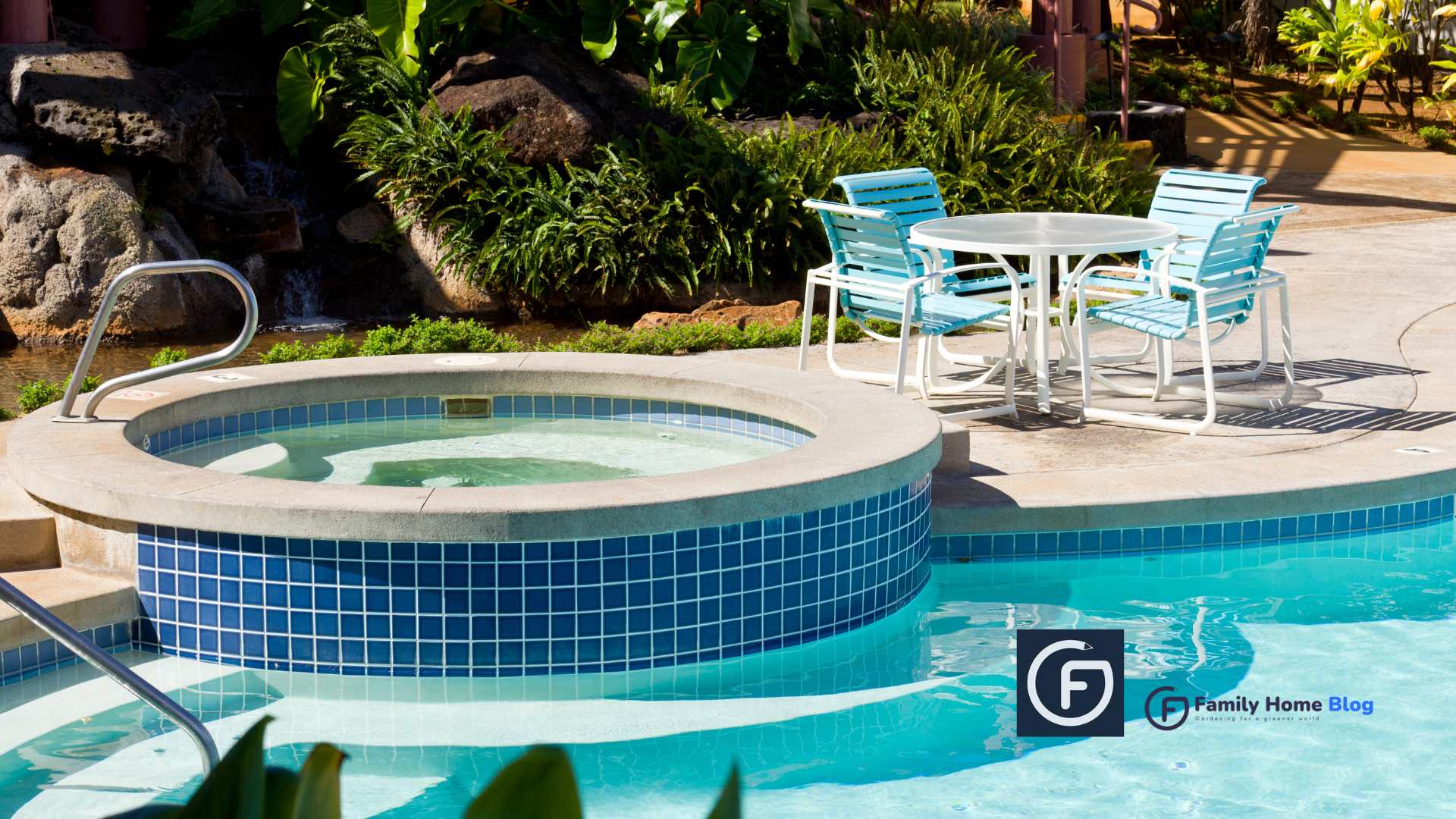Picture this: you’re sinking into a warm, bubbling pool, surrounded by jets that massage your muscles away. The soothing heat and gentle pressure ease your stress, leaving you feeling relaxed and rejuvenated.
Does this idyllic scene sound like something you’d enjoy? If so, you’re probably considering adding a pool or hot tub to your backyard. But what’s the difference between the two, and which one is right for you?
What is a Hot Tub?
A hot tub is a portable pool filled with heated water, typically between 100 °F and 104 °F. It’s designed for relaxation and hydrotherapy, using jets to massage and soothe your muscles. Hot tubs come in various sizes and shapes to accommodate different preferences and spaces. They’re often found in backyards, patios, or decks, providing a private oasis for unwinding after a long day.
What is a Spa Pool?
A spa pool, also known as a spa bath or hydrotherapy pool, shares many similarities with a hot tub. However, it elevates the experience with additional features that enhance relaxation and therapeutic benefits. Spa pools typically have more powerful jets, more sophisticated filtration systems, and specialized seating designed for targeted muscle massage. They may also incorporate aromatherapy, chromotherapy, and other wellness-enhancing elements.
Key Differences
While both hot tubs and spa pools offer a soothing escape, the key differences lie in their features, functionality, and overall experience.
Features:
- Jets: Hot tubs typically have fewer jets than spa pools, focusing on general relaxation. Spa pools, on the other hand, have a higher concentration and variety of jets, allowing for targeted massage and hydrotherapy.
- Filtration: Hot tubs often rely on simpler filtration systems, requiring more frequent water changes. Spa pools typically have more advanced filtration systems, extending water life and reducing maintenance.
- Seating: Hot tub seating is typically designed for general comfort. Spa pools, however, have sculpted seats that contour to your body, providing ergonomic support and enhanced muscle massage.
Functionality:
- Purpose: Hot tubs are primarily designed for relaxation and hydrotherapy. Spa pools, with their advanced features, cater to a wider range of needs, including pain relief, muscle recovery, and overall well-being.
- Personalization: Hot tubs offer a limited range of customization options. Spa pools, on the other hand, provide more personalization, allowing you to tailor the experience to your specific needs and preferences.
Experience:
- Relaxation: Hot tubs provide a relaxing experience through the combination of warm water and jets. Spa pools elevate this experience with targeted massage, aromatherapy, and other wellness-enhancing features.
- Hydrotherapy: Both hot tubs and spa pools offer hydrotherapy benefits, but spa pools, with their advanced features, provide more focused and effective therapeutic treatments.
Heat Source:
- Hot tubs: Hot tubs are traditionally heated using wood-fired, gas-fired, or electric heaters.
- Spa pools: Spa pools typically use electric heaters or heat pumps, which are considered more energy-efficient and environmentally friendly.
Installation:
- Hot tubs: Hot tubs are often portable and can be placed on decks, patios, or other outdoor surfaces.
- Spa pools: Spa pools are more commonly installed in-ground or partially in-ground, providing a more integrated and permanent fixture.
Maintenance:
- Hot tubs: Hot tubs may require more frequent water changes due to simpler filtration systems.
- Spa pools: Spa pools with advanced filtration systems can extend water life, reducing maintenance frequency.
Cost:
- Hot tubs: Hot tubs generally have a lower upfront cost compared to spa pools.
- Spa pools: Spa pools with their advanced features and customization options may have a higher price tag.
Aesthetics:
- Hot tubs: Hot tubs typically have a simpler, more rustic aesthetic, with wood or acrylic shells.
- Spa pools: Spa pools may have a more refined and modern appearance, with sleek designs and integrated lighting.
Additional Features:
- Hot tubs: Hot tubs may have basic features like underwater lighting and built-in speakers.
- Spa pools: Spa pools may offer more advanced features like aromatherapy, chromotherapy, and specialized jets for specific body areas.
Which One Should You Get?
The decision between a hot tub and a spa pool depends on your individual needs, preferences, and budget.
Hot tub:
- Suitable for those seeking a basic hydrotherapy experience and relaxation
- Ideal for smaller spaces or limited budgets
Spa pool:
- Recommended for those seeking a more comprehensive and therapeutic hydrotherapy experience
- Ideal for those with specific wellness goals or pain relief needs
- Suitable for larger spaces and those willing to invest in a premium experience
Considerations:
- Space: Hot tubs are mostly more compact, while spa pools may require larger areas.
- Budget: Hot tubs are typically less expensive than spa pools.
- Maintenance: Spa pools may require slightly more maintenance due to their advanced features.
- Therapeutic Needs: If you have specific pain or wellness goals, a spa pool offers more targeted treatments.
Conclusion:
Whether you’re seeking a moment of tranquility or a therapeutic escape, both hot tubs and spa pools offer a pathway to relaxation and well-being. Understanding the key differences and considering your individual needs will guide you towards the perfect choice, transforming your home into a sanctuary of personal rejuvenation.









